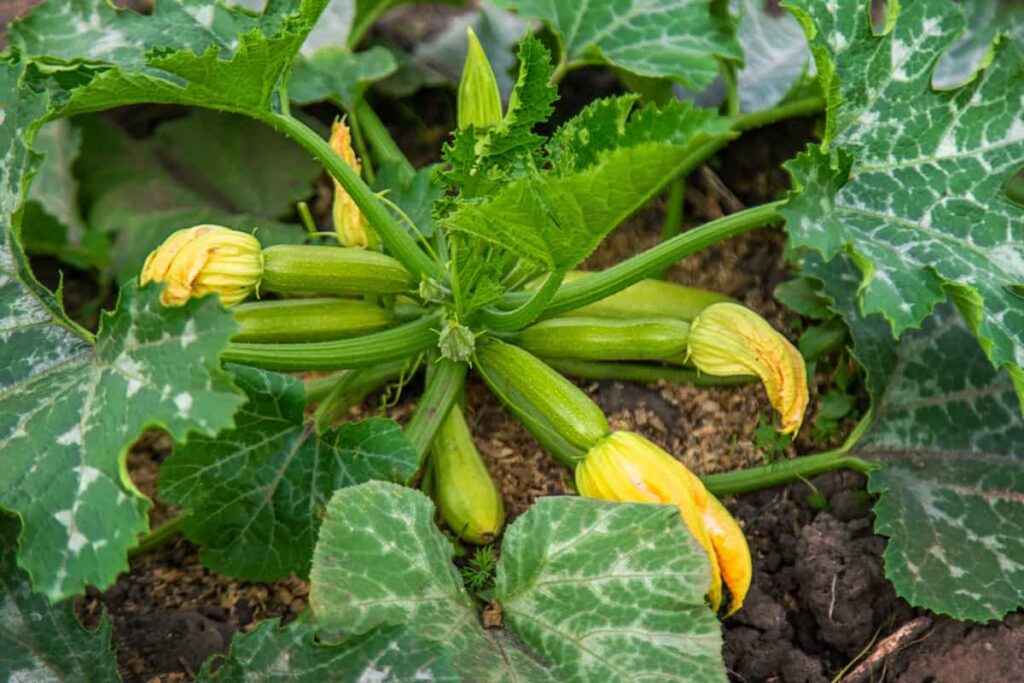Zucchini (Cucurbita pepo) is a summer squash variety in the gourd family (Cucurbitaceae), grown for its edible fruits. Zucchini farming in India offers numerous benefits to farmers and the agricultural industry as a whole. The key advantage is the high market demand for this versatile vegetable. Furthermore, Zucchinis are known for their high yield potential per acre of land.

Zucchini Farming in India
Zucchini is cultivated for its delicious and edible fruits that are not only tasty but also packed with essential nutrients. Zucchini farming in India has gained significant popularity in recent years. Its edible fruits are not only delicious but also packed with essential nutrients.
Climate and Soil Requirements for Zucchini Farming
This versatile vegetable thrives in warm temperatures, making it well-suited for the Indian climate. Zucchini plants prefer a temperature range of 20-30°C, with optimal growth occurring at around 25-28°C. In terms of rainfall, Zucchini requires moderate moisture levels. When it comes to soil requirements, Zucchini prefers well-drained, loamy, or sandy soils that are rich in organic matter. The pH level must be acidic to neutral (6-7).
Varieties of Zucchini Suitable for Indian Conditions
One popular Zucchini variety in India is the ‘Black Beauty’ Zucchini. Known for its dark green color skin and tender flesh, this variety performs well in both hot and humid climates. Another suitable option is the ‘Golden Summer’ Zucchini. As the name suggests, this variety produces vibrant yellow fruits that add color to any dish.
For those looking for something slightly different, the ‘Costata Romanesca’ Zucchini is worth considering. This heirloom variety has ribbed skin and a nutty flavor. If you’re interested in smaller-sized Zucchinis, consider planting ‘Eight Ball,’ which produces perfectly round fruits that are ideal for stuffing or slicing into rounds.
Step-by-Step Guide to Growing Zucchini in India’s Varied Climates
- Select the right location for your Zucchini plants. They require well-drained soil with good organic matter content. Next, sow the Zucchini seeds directly into the prepared soil. Make sure to plant them at a depth of around 1 inch and keep them spaced about 3 feet apart to allow enough room for growth.
- After sowing, water the seeds gently but thoroughly. Zucchini plants need regular watering throughout their growing season, especially during dry spells. However, avoid overwatering the Zucchini plant as it can lead to root rot.
- As the Zucchini plants start to grow, provide support if needed by using stakes or trellises. To encourage healthy growth and fruit production, fertilize your Zucchini plants every two weeks with balanced organic fertilizer or compost tea.
- Keep an eye out for common pests such as aphids, cucumber beetles, and squash bugs. Regular inspection of leaves and fruits will help you find any issues early on so that you can take appropriate measures like handpicking or using organic pest control methods.
- Harvest your Zucchinis when they reach around 6-8 inches in length for optimal taste and texture.
In case you missed it: Best Zucchini Fertilizer: What, When, and How to Apply

Zucchini Seed Germination and Sowing Time India
In India, the ideal time to sow Zucchini seeds varies depending on the region and climate. To germinate Zucchini seeds, soak them overnight in warm water before planting. This helps soften their outer coat and speed up germination. Sow the pre-soaked seeds about an inch deep into the prepared soil, spacing them at least two feet apart to allow ample room for growth.
Once your Zucchini seedlings emerge, thin them out by removing weaker plants so that only one healthy plant remains per foot or desired spacing interval. Remember that different regions in India have different climatic conditions, so adapt your sowing time accordingly based on local weather patterns and temperature fluctuations.
Organic Zucchini Farming Practices in India
The key aspect of organic Zucchini farming in India is soil preparation. Farmers need to ensure that the soil is rich in organic matter by using compost or manure. This helps to provide essential nutrients to the growing plants. When it comes to pest control in Zucchini, organic farmers rely on natural ways such as crop rotation, intercropping with companion plants, and biological pest control agents.
Weed management can be challenging in any farming, but organic farmers tackle this issue through manual weeding or mulching techniques. Mulching not only helps suppress weed growth but also conserves soil moisture and regulates temperature around the plant roots.
Zucchini Farming Cost Per Acre
Zucchini farming in India has gained significant popularity due to its high demand and profitability. The cost of Zucchini farming per acre in India can change based on several factors, such as the location, seed quality, fertilizers, irrigation systems, labor costs, and pest control measures.
| Items | Estimated Cost (Per Acre) in INR |
| Seed Cost | |
| Quantity Required | 1 to 2 kg |
| Cost per kg | ₹ 400 – ₹ 600 |
| Land Preparation | ₹ 2,500 – ₹ 4,000 |
| Fertilization | |
| Farmyard Manure | ₹ 10,000 – ₹ 15,000 |
| NPK (as per soil test recommendations) | ₹ 3,000 – ₹ 5,000 |
| Irrigation | ₹ 3,000 – ₹ 5,000 |
| Labor (Planting, Weeding, Harvesting) | ₹ 10,000 – ₹ 15,000 |
| Pest and Disease Control | ₹ 2,000 – ₹ 3,000 |
| Miscellaneous Costs | ₹ 2,000 – ₹ 3,000 |
| Total Estimated Cost | ₹ 32,900 – ₹ 51,600 |
Zucchini Farming Profit Per Acre
Zucchini farming can be a profitable venture for farmers in India, with the potential to yield significant profits per acre. The profit margin of Zucchini farming in India depends on various factors such as market demand, cost of production, and proper management practices.
In case you missed it: Land Rate Per Acre in India: Discover Land Costs of Agriculture and Farm Lands from Kashmir to Tamil Nadu

| Item | Amount |
| Revenue | |
| Average Yield per Acre | 5,000 – 6,000 kg |
| Market Price per Kg | ₹ 20 – ₹ 30 |
| Total Revenue (Avg.) | ₹ 100,000 – ₹ 180,000 |
| Costs (from the previous table) | |
| Total Estimated Cost | ₹ 32,900 – ₹ 51,600 |
| Profit | |
| Gross Profit (Revenue – Costs) | ₹ 48,400 – ₹ 147,100 |
Zucchini Yield Per Acre
The amount of yield can change based on various factors such as soil quality, climate, cultivation practices, and the variety of Zucchini being grown. On average, a well-managed Zucchini farm can yield around 5,000 – 6,000 kg per acre.
Zucchini Crop Duration and Planting Season in India
Zucchini is a versatile crop that can be grown in various regions of India thanks to its adaptability to different climates. The crop duration and planting season for Zucchini in India vary depending on the specific region and weather conditions. In most parts of India, Zucchini is typically planted during the spring or summer months when temperatures are warm.
The crop duration for Zucchini ranges from 60 to 70 days from sowing to harvest. The ideal planting season varies according to the region’s climate but generally falls between February-March and July-August.
Zucchini Companion Plants
The best companion plan for Zucchini is a marigold. Marigolds have natural pest-repellent properties that can help keep away harmful insects like aphids, nematodes, and cucumber beetles. Another beneficial companion plant for Zucchini is radishes. Radishes act as sacrificial plants by attracting pests like flea beetles away from the Zucchini crop. Additionally, herbs such as basil and dill make excellent companions for Zucchinis. These herbs add flavor to your dishes and also attract beneficial insects that feed on common garden pests.
Market Demand for Zucchini in India
Zucchinis have good market demand both domestically and internationally. With growing awareness about healthy eating habits among consumers, there is a rising demand for fresh produce like Zucchini in the Indian market. Zucchini has been gaining popularity among health-conscious consumers in India due to its mild flavor and versatile nature.
In case you missed it: Golden Berry Farming in India: Best Cultivation Practices for Cape Gooseberry

The increasing demand for fresh, nutritious produce has created a promising market for Zucchini farmers across the country. In recent years, there has been an upsurge in awareness about sustainable farming practices and locally sourced produce. Overall, the market demand for Zucchinis is expected to continue growing as more people recognize its health benefits and embrace its culinary possibilities.
Conclusion
Zucchini farming holds immense importance in India due to its several benefits and potential for profitability. This versatile vegetable is rich in essential nutrients, making it a valuable addition to the Indian diet. Its high fiber content aids digestion and promotes overall health. It plays a crucial role in boosting agricultural productivity in India.
- Aquaponic Farming at Home: A Step-By-Step Guide
- Profitable Village Farming Business Ideas in 2024
- High-Yield Aquaculture: Fast-Growing Fish for Farming
- Effective Fish Pond Construction Techniques for Beginners
- Irrigation and Water Management in Pineapple Farming
- Blossom to Harvest: Mastering Flowering and Pollination in Papaya Farming
- Pig Fattening Essentials: From Selection to Sale for Beginners
- Raising Wagyu Cattle: A Complete Guide for Premium Beef Production
- Soil Types and Their Water Holding Capacity
